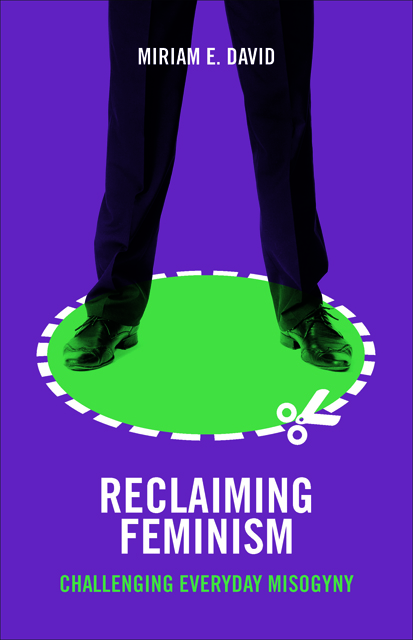Book contents
- Frontmatter
- Contents
- About the author
- Acknowledgements
- A note about the waves of feminism
- one Feminist reflections on a lifetime in academe
- two Changing feminism
- three Feminist pioneers
- four Gender and generations
- five Cultivating feminists
- six A feminist resurgence
- seven Feminists on campus
- eight Feminist fortunes
- References and select bibliography
- Index
four - Gender and generations
Published online by Cambridge University Press: 15 April 2023
- Frontmatter
- Contents
- About the author
- Acknowledgements
- A note about the waves of feminism
- one Feminist reflections on a lifetime in academe
- two Changing feminism
- three Feminist pioneers
- four Gender and generations
- five Cultivating feminists
- six A feminist resurgence
- seven Feminists on campus
- eight Feminist fortunes
- References and select bibliography
- Index
Summary
Today’s zeitgeist could hardly be more different from the 1970s, given explicit reference to misogyny, then normally called ‘patriarchy’. To link misogyny with racism, ‘misogynoir’ has been coined by black feminist commentator Feminista Anyangwe (2015). Complex sociocultural and political changes in women’s involvement in public life, located within a vastly changed global knowledge economy, are now characterised by rampant individualism of the ‘selfie’ generation, a fitting double-entendre. The 1970s zeitgeist focused on collective discussions about women’s economic, education and employment opportunities, also linked to changes in family and personal lives – questions of birth control, child, family and elder care and sexuality. These were hotly debated between liberal, Marxist, radical and socialist-feminists, and whether to pursue state means to achieve these broad goals. How much public money could and should be invested in opening up opportunities for women, especially as wives or mothers, and carers? Political protest by many feminist groups continued unabated, but whichever means were chosen, sociocultural changes occurred rapidly during this decade. These continued inexorably despite the backlash and rise of the conservative, new right internationally, characterised by forms of economic liberalism, contrasting with conservative social policies. Similarly, economic liberalism and individualism continued unabated, morphing into neoliberalism by the end of the 20th century.
In the UK, Margaret Thatcher became the first woman leader of the Conservative Party in 1974, and in 1979 was elected the first woman British Prime Minister. She continued as Prime Minister throughout the 1980s, finally relinquishing office in 1992. She was clearly part of what Martin (2013) calls the ‘breakthrough generation’, despite her very conservative policies. She resisted but did not rescind a myriad of changes in public and personal lives. Particularly important were legislative changes – in the UK the Abortion Act 1967, Equal Pay Act 1970 and Sex Discrimination Act 1975, setting up the Equal Opportunities Commission (EOC), alongside the Race Relations Act 1976. I do not want to argue that Thatcher was in any sense a feminist, as we argued in Closing the gender gap (Arnot et al, 1999), much to Ann Oakley’s ire in her review of our work, although she did advance some liberal feminist arguments early in her career, about women’s needs for childcare.
- Type
- Chapter
- Information
- Reclaiming FeminismChallenging Everyday Misogyny, pp. 87 - 116Publisher: Bristol University PressPrint publication year: 2016

